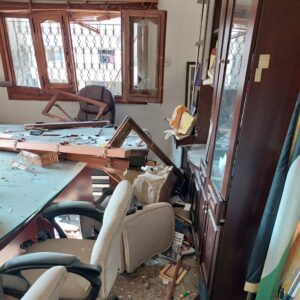‘The international legal order needs repair — and Gaza is a part of this’

The destroyed office of Al Mezan Center, Gaza, 2024
Ghousoon Bisharat introduces an interview with Issam Younis in +972 on 24 May 2024:
In a whirlwind week for global legal developments, two of the world’s highest courts took landmark steps to address the Gaza war that has been raging since the attacks of October 7.
**** ***** ****
To unpack the significance of these developments, +972 spoke with Issam Younis, director of the Gaza-based Al Mezan Center for Human Rights, and a former commissioner general of the Palestinian Independent Commission for Human Rights. Younis was displaced with his family from Gaza City at the outset of the war, before leaving the Strip for Cairo, where he currently remains.
In a wide-ranging interview, Younis welcomed Khan’s request for arrest warrants, emphasizing the need to use every legal tool to hold Israel accountable; he similarly saw the ICJ ruling as a significant step toward securing a permanent ceasefire in Gaza. Nonetheless, Younis warned, the global system of international law was clearly at its breaking point.
Palestinians, he explained, feel that there is a “chronic antagonism” between their pursuit of justice and a world in which the rules of international law are only selectively applied to certain actors. Gaza, in Younis’ view, is thus a test for the legal order, as countries from the Global South fight to uphold the moral convictions articulated by the Global North nearly eight decades ago.
Younis further argued that targeting Netanyahu and Gallant was the “easy thing to do,” as they are the unpopular public faces of Israel’s military campaign. But he stressed that the ICC must go after a range of officials who executed the crimes, including those being examined by the court’s larger probe on the occupied territories, such as settlement expansion in the West Bank. Still, Younis remained cautiously optimistic: “Justice is not achieved by a knockout, but by total points,” he said.
The interview has been edited for length and clarity.
Many Palestinians have long felt international law has failed to protect them or advance their struggle, culminating in what we see today in Gaza. As someone who has dedicated their life to this field, what would you say to fellow Palestinians about how to view the current legal developments?
There are two responses to Khan’s request for arrest warrants. The first is that we are optimistic in the long term, on the strategic level. We are not naïve, and we are aware that international law is the product of what states accept for themselves. But we try as much as possible to use these existing tools. As the poet Al-Tughra’i wrote, “how narrow life would be without the space for hope,” so we must keep hope alive.
The second response requires understanding the international legal system. The United Nations, the Geneva Conventions, and other postwar regimes and institutions were established by the victors: to protect international peace and security, maintain the global order, and facilitate international cooperation. These rules have become too narrow to address the existing injustices in the world, to the extent that international law now clearly only applies to some countries and some human beings, but not to all. How can this immorality [in Western countries’ response to Gaza] be explained otherwise?
